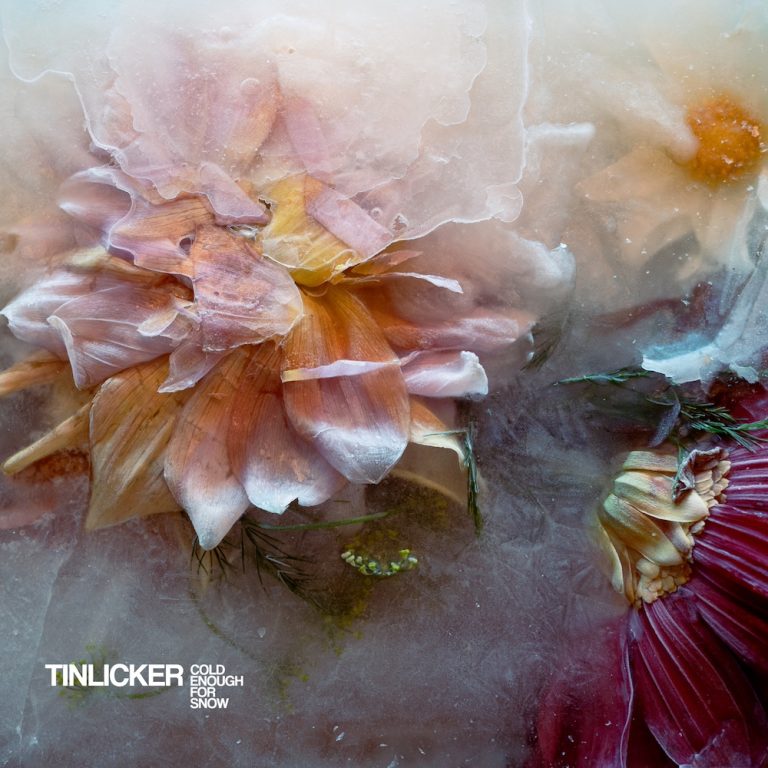What’s fairer: judging an album by its cover or by its guest spots? Sure enough Tinlicker’s new album Cold Enough For Snow will draw in a few new listeners with its pretty New Order-esque artwork, complete with flowers encased in ice. But for folks new to the Dutch electronic duo, the featured vocalists might be the hook: Placebo’s Brian Molko, Editors’ Tom Smith, and Circa Waves drop in and contribute to a track each on the album. Alongside them is Australian singer Cloves, South African singer/songwriter Julia Church, and the Boxer Rebellion’s Nathan Nicholson, who returns after multiple features on Tinlicker’s 2022 album In Another Lifetime.
Fair enough: in 2024 this isn’t an A-list lineup, but it certainly shows that Tinlicker have connections and friends in the record industry. The duo – made up of Micha Heyboer and Jordi van Achthoven – make the kind of electronic dance music that needs a voice though. Three albums in and, while they have grown, they struggle to say anything of real value when left to their own devices. Following this trend, Cold Enough For Snow’s best moments come when the vocalists take the stage and shine like a beacon.
“Staring Down The Sunset” layers and harmonises Nathan Nicholson’s voice to alluring effect, as Tinlicker play with shadows in the background, veering away from any clichéd bombastic drops. “Glasshouse” opens up the album on a blousy and lightly fragrant note as Julia Church finds a sweet spot between siren and torch song, met well with airy but invigorating synths that ripple and shimmer. When she returns later in the tracklist on “Slipstream” the energy is higher, a pulsating drive carrying her as what sounds like strobe lights start flickering. Meanwhile, across six minutes “Who I’m Not” explores some darker hues, and while Cloves delivers a despondent blank-stare chorus, it matches the empty industrial estate feel as synths warble out into what sounds like an empty warehouse.
Funnily enough the more recognisable guest names find themselves with the weaker and more baffling tracks. Circa Waves’ Kieran Shudall is better than the trite and uninspired refrain he’s given on “Nothing To Lose”. “We are the setting sun / We are forever young / We could be anyone,” he sings over a sunny meld of guitars and synths, offering as much inspiration as you would expect from a Peloton exercise video. On “This Life” Tom Smith goes to earn his paycheck with each laughable “awooo” and iteration of vacant lyrical nonsense like “Did anyone hear our laughter? / Did anyone count our steps?” The end result feels like a Coldplay track taken out of the trash and vamped up with washed out synths and chattering drums, but too overly earnest in its original guise to be able to form any sort of emotional connection to.
The worst offender is Placebo’s Brian Molko, whose lyrics come off like the scribbles from an angsty teenager’s diary. “Sometimes I get so angry that I want to go and cause some pain,” they warn on “Nowhere To Go” before descending into a worrying mantra of “rage is love with nowhere to go / so come home” that feels awkwardly like an abusive partner guilting a victim to take them back. Tinlicker paint with red flashing lights and the odd snarl of what sounds like guitar feedback, but the whole thing feels like a misplaced attempt at mining darker territory. Following track “Strawberry” feels equally curious, if not a wasted opportunity. Nathan Nicholson’s words feel like placeholder lyrics they forgot to change, all while the Metropole Orkest swell with beige grace and a regal air. Sure, the sax solos are an interesting choice, but the whole ensemble feel underutilised, the orchestra given nondescript music that does little more than move along with the simple chord patterns of the song’s skeleton.
“Strawberry” turns out to be pretty indicative of a vast chunk of the material on Cold Enough For Snow: untapped potential not used as well as it could have been. It’s easy to point fingers at the likes of Molko or Smith for singing forgettable sentiments, but it’s Heyboer and van Achthoven who are meant to be bringing this altogether. The duo go out in search of euphoric highs but never quite hit the mark. Tracks without guests are competent workouts at best, but ache to go harder: “Revolution” has promise with its Silent Shout-like tone, but goes through the motions instead of anywhere interesting; “In Your Eyes” grinds mechanically but is missing personality; and closing track “Pretender” teases a big bass drop and blowout that never comes, instead cutting short and turning on the house lights just when there was potential for things to get fun.
It was perhaps a red flag when I noticed that the press bio for the album was worryingly scant on supporting information. Beyond it being Tinlicker’s first release for the [PIAS] Électronique label, there seems to be little to say about the music here beyond the origins of the band’s name and the names of the guests. (Instead space is taken up in the presser to praise how the Dutch duo can boast of a song of theirs being used as the “official opening song of Tesla’s new factory in Texas”, which is a strange brag to say the least.) And that’s Cold Enough For Snow in a nutshell: over an hour long, it’s a lengthy set, but rarely gives the listener that substantial morsel they need and want from music like this. It’s functional at best and has a few spots that might be worth a revisit or two, but ultimately Cold Enough For Snow is hard proof that appearances – and guest appearances too – can be deceiving.

